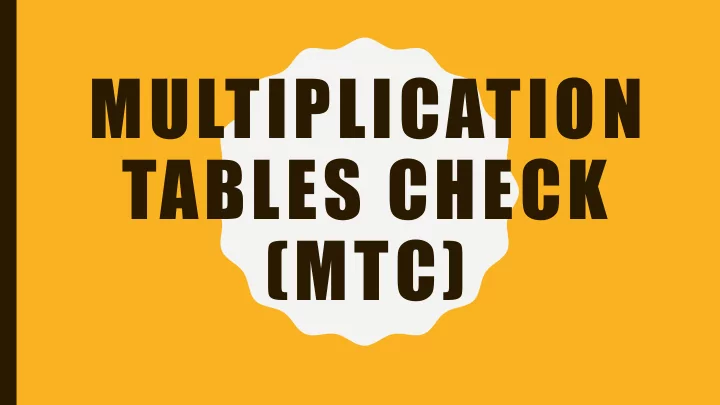

MULTIPLICATION TABLES CHECK (MTC)
WHAT WE KNOW… • The Multiplication Tables Check (MTC) was officially announced by the Department for Education (DfE) in September 2017. • It will be administered for children in Year 4, starting in the 2019-20 academic year. • Primary-school children are expected to know all their times tables up to 12x12, by the end of Year 4. At the minute, they are not formally tested on them other than through multiplication questions in the Year 6 maths SATs. • The purpose of the MTC is to determine whether Y4 pupils can recall their multiplication tables fluently (being able to answer times tables questions accurately and quickly, without having to work out the answers).
WHICH CHILDREN WILL SIT THE MTC? • It will be taken by children in Year 4, in the summer term (during a three-week period in June; schools will decide which day to administer the check). • In June 2019 the multiplication check will available for a trail run, we will be taking part in this at ESPA (current Y4).
HOW WILL CHILDREN BE TESTED? • Children will be tested using an on-screen check (on a computer or a tablet), where they will have to answer multiplication questions against the clock. • This will be the first time that the DfE has used computerised tests in primary schools. Calculators and wall displays that could provide children with answers will be removed from the room the MTC is taking place in. • The test will last no longer than 5 minutes and is similar to other tests already used by primary schools. Their answers will be marked instantly. • Children will have 6 seconds to answer each question in a series of 25. Each question will be worth one mark and be presented to the child in this format - 3 x 4 = ____
CONTINUED… • Questions will be selected from the 121 number facts that make up the multiplication tables from 2 to 12, with a particular focus on the 6, 7, 8, 9 and 12 times tables as they are considered to be the most challenging. • Each question will only appear once in any 25-question series, and children won't be asked to answer reversals of a question as part of the check (so if they've already answered 3 x 4 they won't be asked about 4 x 3). • Once the child has inputted their answer on the computer / device they are using, there will be a three-second pause before the next question appears. Children will be given the opportunity to practise answering questions in this format before the official check begins. • The six-second time limit per question has been decided on by the DfE because it should allow children enough time to demonstrate their recall of times tables without giving them the time to work out the answers to each question.
WHAT IF A CHILD DOESN'T DO WELL IN THE MULTIPLICATION CHECK? • There will be no "pass mark" (expected standard threshold) and no child will "fail" the test. • Multiplication facts will be the only things tested (there will be no testing of children's knowledge of division facts or problem-solving in the check). • The DfE says the purpose of the check is to help teachers identify which children are falling behind and target areas where they’re not being given a chance to succeed.
HOW CAN YOU HELP YOUR CHILD PRACTISE THEIR TIMES TABLES? • Practising times tables by rote. • Asking your child multiplication questions out of order – such as ‘What’s 11x12? What’s 5x6?’ • Asking your child the related division facts: ‘What’s 8 divided by 4? What’s 9 divided by 6?’ • Using arrays to help your child memorise times tables – you can use fun objects like Smarties or Lego bricks to make it more entertaining. • Giving your child word problems to test their skills, like ‘If Peter has 800ml of orange juice and needs to share it between four friends, how much can they each have?’ • Using apps and games like Times Table Rockstars multiplication games to build speed. • Singing times tables using songs like Percy Parker (You Tube).
Recommend
More recommend